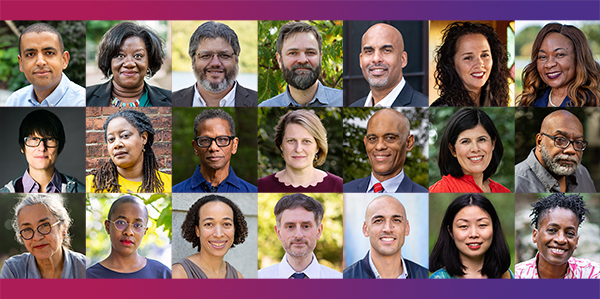Marlies Carruth, Director, MacArthur Fellows, writes about the changing landscape of science, technology, engineering, and mathematics (STEM) research and how the unrestricted award of the MacArthur Fellowship supports scientific creativity.
As the MacArthur Fellows Program continues its mission of identifying and supporting extraordinarily creative individuals across all fields, we note a changing landscape for supporting individuals in Science, Technology, Engineering, and Mathematics (STEM) research.
Over the 40 plus years of the fellowship’s existence, the landscape of science research has evolved to extend beyond the traditional research university academic setting and broad governmental funding models. Now, privately funded research institutions, such as the Howard Hughes Medical Institute and the Chan-Zuckerberg Research Center, are major supporters of scientists, helping to craft new and impactful research directions.
While national governmental agencies still invest heavily in scientific research, primarily by supporting science labs and institutions, roughly 70 percent of funding is concentrated in biology, technology, and engineering, leaving other fundamental scientific inquiry under resourced.
Grants and prizes to individual STEM researchers are growing in number and can be viewed as complementary (if not competitive) with the MacArthur Fellowship. For our recent strategy review, we tracked nearly 60 STEM awards to individuals, as part of the benchmark community against which we consider our work. Many of these awards originated in the last 20 years.
Indeed, the reality is complicated. Nearly all this financial support to science—in the form of project grants—funnels through an institution, includes overhead funds, and restricts use.
Our fellowship provides unrestricted financial support to individuals—a distinctive, enabling, and complementary source of support to leaders in STEM.
The MacArthur Fellowship is different. Our fellowship provides unrestricted financial support to individuals—a distinctive, enabling, and complementary source of support to leaders in STEM (as seen recently with members of the 2024 class) and beyond.
As MacArthur Fellow and Nobel Laureate Andrea Ghez, an astrophysicist, describes it: “This allows so much more flexibility for the Fellows to identify what would have the most significance on their creative work. [The fellowship] gave me the flexibility necessary to succeed in a highly competitive environment.”
A Unique Award
The MacArthur Fellows Program has always endeavored to support exceptionally creative individuals. Our award is unique in philanthropy because it features multi-year, no-strings-attached support, and because of the interdisciplinary cohort of the MacArthur Fellows.
The annual MacArthur Fellowship award enables a short list of scientists in both fundamental and translational knowledge—from theoretical to applied science—to do work that may not otherwise be easily funded. In light of the challenges confronting modern science today, from the denial of climate change, to the mistrust of medicine and healthcare systems, to ethical concerns surrounding emerging technologies, such timely support matters and emphasizes the values of the Fellows Program and the mission of the Foundation more broadly.
The thinking behind the award has been not only to support individuals with a strong a track record of past achievement and the potential to continue extraordinarily creative work but to identify individuals who could potentially leverage an interdisciplinary community and access the inspiration and intellect of others outside of a narrow field of practice. The fellowship’s focus gives this award different meaning for the individuals who receive it, across STEM fields and other domains of inquiry and societal impacts.
Fostering Innovation in STEM
Since the fellowship began in 1981, 347 individuals in STEM have received MacArthur Fellowships, nearly one third of all fellowships awarded.
These fellowships foster research and ideas which might not be sufficiently funded by government agencies, that prioritize research trends, or which exist outside of the interests of billionaire funders.
The visibility of our support for scientists elevates the awareness of research that could be overlooked. The support for scientific research itself ripples beyond individuals, subfields, academic disciplines, and the STEM domain. In this way, the MacArthur Fellowship contributes through a unique combination of features to a thriving ecosystem of support for STEM endeavors.
The visibility of our support for scientists elevates the awareness of research that could be overlooked.
Consider two recent Fellows whose work illustrates the remarkable curiosity and creativity for which the MacArthur Fellows are recognized. MacArthur Fellows chemist Will Dichtel and chemical engineer Paul Dauenhauer expanded their fundamental chemical research toward solutions-driven work to address prominent environmental challenges. The translation of their research appears in the removal of “forever” chemicals from soil and water and in significantly increasing the capacity to capture and store carbon dioxide from the atmosphere, respectively. Their science, through a positive impact on the environment we all share, is additive to all our lives.
Now is an exciting—and important—time to fund imaginative thinkers and doers and to support their bold work beyond restrictive or disciplinary frames.
We hope our award enables Fellows across domains, and inspires the public to appreciate the knowledge, wonder, and opportunity of understanding the world around us—from the molecular to the galactic, and at all scales in between.




